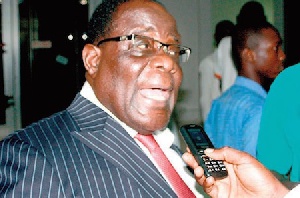A long-time university lecturer has described Ghana as a country that is enmeshed in deficit which is causing a lot of socio-economic hardships to the citizens.
“Madam Chairman, Ghana is a deficit country. Everything is in deficit. The problem is the deficit,” Professor Kodwo Ewusi, Dean of Graduate Studies of Methodist University College (MUC), told the audience in Accra last Wednesday.
Prof. Ewusi was speaking on the topic 'The Future of Education, Health and Oil in Economic Growth in Ghana' at the 48th J.B. Danquah Memorial Lectures.
Organised by the Ghana Academy of Arts and Sciences (GAAS), the three-day lecture series was on the theme: 'Human Capital and Economic Growth in Ghana.'
The Danquah lectures series was instituted in 1968 in memory of Dr Joseph Boakye Danquah, a lawyer, philosopher, scholar, nationalist, playwright, politician, publisher and foundation member of the GAAS.
He stated that the country has budget, fiscal and other deficits, which the government must address, adding that the situation has aggravated the economy. He warned that the International Monetary Fund (IMF) bailout should be seen as the panacea for resuscitating the economy, expressing his doubts with “Let's wait and see.”
Prof. Ewusi, who was the Head of the Economics Department of MUC, said Ghanaians should wait for six months before they can feel the salvaging effects of the IMF bail-out.
He said the immediate future of the economy was not bright due to the shortage of electricity and water.
He contended that the prospects of the economy were bleak, as small- and -medium enterprises were collapsing. “I'm not too optimistic.” The economic don was, however, upbeat that the economy could improve in the medium.
He explicated that it was the sophistication of Ghana's industrialisation which would make its status as a middle-income country, but the country had not really obtained a middle-income status because it imports most of its consumer goods, including chopsticks.
He argued that based on a per capita income of US$905, “it was President [John Agyekum] Kufuor who took us to middle-income status” in 2006.
He noted that the countries with a per capita income of between US$1,006 and US$3,975 are classified as lower middle-income earners, while those with between US$3,976 and US$6,285 are middle-income countries. Countries with per capita income between US$6,286 and US$12, 785 are categorised into upper middle-income status.
The Professor said the country currently has a per capita income of US$1,500, as its economy grew at 4.2 per cent in 2014 whilst Malaysia has a current per capita income of US$8,000, with a growth rate of 10 percent.
He predicted that the growth rate for 2015 would be below four per cent, against the target rate of 3.5 percent for this year.
He said Ghana was declared a middle-income country in 2012 when the Ghana Statistical Service (GSS) rebased the national income account. Casting doubt over the statistics released by the GSS periodically, he observed that the GSS was “now notorious for revising its figures every quarter.”
He recounted that Ghana had per capita incomes of US$1,034.4, US$1,317, US$1,574 and US$1,872 in 2007, 2008 and 2009 and 2010 respectively.
Commenting on the Cedi, Prof. Ewusi pointed out that the currency depreciated by 37.5 per cent in 2014. “There are further pressures on it to depreciate further,” he quipped.
He specified a growth model where human capital was defined as investment in education and health as well as oil and other natural resources which could be incorporated into an augmented endogenous growth model.
Addressing some policy issues in education and health, he said financing secondary and tertiary education was crucial. “There is no co-integration between education and economic growth; however it is established that education influence economic growth positively and significantly at a 95% confidence interval in the short run,” he said.
General News of Wednesday, 4 March 2015
Source: Public Agenda













